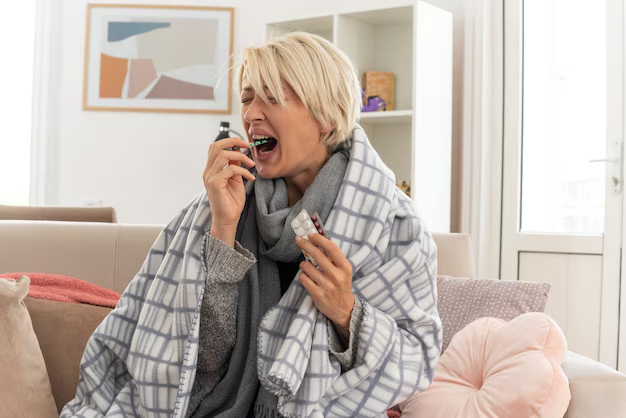Understanding Walking Pneumonia: How Long Does It Last?
Sneezing, coughing, and a general feeling of fatigue—these symptoms might just seem like a stubborn cold. But for many, they could indicate walking pneumonia, a less severe form of pneumonia. Unlike its more intense counterpart, walking pneumonia often allows sufferers to continue their daily routines, albeit with discomfort. This brings us to the pressing question: How long does walking pneumonia last?
Let's explore this condition from multiple relevant angles to provide a comprehensive understanding for you and ensure you're prepared for whatever steps you need to take next.
What Is Walking Pneumonia?
Walking pneumonia, or atypical pneumonia, is typically caused by certain bacteria, most commonly Mycoplasma pneumoniae. It shares many symptoms with other respiratory infections, including coughing, mild flu-like symptoms, and just feeling worn out.
Distinguishing Walking Pneumonia
- Milder Symptoms: Unlike regular pneumonia, symptoms tend to be less severe and may develop more gradually.
- Continued Activity: Many experience just enough energy to continue daily tasks, hence the term "walking."
Understanding whether you're facing walking pneumonia can offer peace of mind when faced with persistent symptoms.
How Long Do Symptoms Last?
The duration of walking pneumonia varies based on several factors, including the individual's health, age, and response to treatment. Generally, here’s what you might expect:
- Symptom Duration: Symptoms can last anywhere from one to four weeks.
- Cough Persistence: A cough associated with walking pneumonia can linger for weeks or even months post-recovery.
- Recovery Variations: Some may recover faster, especially individuals who are healthy and young, while others may take more time.
Children vs. Adults
- Children tend to recover quicker but may experience more intense symptoms initially.
- Adults, especially those with pre-existing conditions, might find the illness more prolonged.
Understanding these nuances allows you to better anticipate the course of illness in different age groups.
Factors Influencing Recovery Time
Several elements can affect the duration of walking pneumonia:
- Overall Health and Immune System: Healthier individuals often experience shorter recovery periods.
- Promptness of Diagnosis: Those diagnosed earlier can begin treatment sooner, reducing symptom duration.
- Lifestyle Choices: Adequate rest, hydration, and a nutritious diet support faster recovery.
Each of these factors underscores the importance of maintaining a healthy lifestyle, which can significantly influence recovery length and comfort.
Managing Walking Pneumonia at Home
Addressing walking pneumonia at home requires a mix of self-care practices that facilitate recovery without pushing the body too hard:
- Rest: Getting enough rest is crucial—allowing your body time to heal can expedite the recovery process. 🛌
- Hydration: Drinking plenty of fluids helps thin mucus and fight off infections. Remember, water is your best ally.
- Nutritious Diet: Eating balanced meals can bolster your immune system, providing the nutrients needed to fight illness.
These practical steps can enhance recovery and reduce discomfort.
When to See a Healthcare Professional
While walking pneumonia is often mild, there are times when seeking professional advice becomes necessary:
Signs That Require Medical Attention
- Persistent Fever: A continuous fever is a signal to consult a healthcare provider.
- Breathing Difficulties: Any problems breathing should be addressed immediately.
- Painful Cough: A severely painful cough might indicate complications.
If you or a loved one experiences these symptoms, don't hesitate to contact a healthcare professional for guidance.
Preventing Walking Pneumonia
Prevention is always better than cure. Here's how you can reduce the risk of contracting walking pneumonia:
- Hygiene Practices: Regular hand washing and using hand sanitizers can significantly lower infection risk. 🧴
- Avoiding Smokers: Smoke can damage lung defenses, increasing susceptibility to infections.
- Vaccinations: Keep vaccinations current; while not preventing walking pneumonia directly, they can protect against related illnesses.
By adopting these habits, you stand a better chance against walking pneumonia and other respiratory illnesses.
How to Minimize Risk of Spread
If you're diagnosed with walking pneumonia, taking measures to prevent spreading it to others is vital:
- Avoid Close Contact: Steer clear of close interactions with vulnerable individuals, like the elderly or immunocompromised.
- Cover Your Coughs: Use tissues or your elbow to cover when coughing to help protect others.
- Clean Surfaces: Regularly disinfect surfaces that you touch often.
These considerate actions can help maintain the health of those around you.
The Psychological Impact of Illness
Dealing with an illness like walking pneumonia can also affect your mental well-being:
- Communication: Sharing your feelings with friends or loved ones can alleviate the emotional burden.
- Mindfulness and Relaxation Techniques: Incorporating practices such as meditation can aid emotional resilience during illness.
Acknowledging the psychological aspect highlights the holistic nature of health and recovery.
Final Insights on Walking Pneumonia
Walking pneumonia, while milder than traditional pneumonia, deserves respect and careful attention. By understanding symptoms, managing them responsibly, and taking preventive measures, you can navigate this condition more effectively. Remember, your health is a priority, and taking steps toward understanding and self-care can make all the difference.
Quick Summary for Navigating Walking Pneumonia
- Symptoms Duration: Typically 1-4 weeks, but recovery might vary.
- Prioritize Rest: Essential for quick recovery. 🛌
- Stay Hydrated: Vital to thin mucus and fend off bacteria.
- See a Doctor If: You experience persistent fever or breathing difficulties.
- Prevention: Emphasize hygiene, avoid smokers, and stay updated with vaccinations. 🧼
- Mental Health: Maintain communication and employ relaxation techniques for emotional support. 🧘♀️
Armed with this knowledge, you're better prepared to handle walking pneumonia confidently!

Related Articles
- a Typical Pneumonia
- Can a Cold Turn Into Pneumonia
- Can a Sinus Infection Turn Into Pneumonia
- Can Amoxicillin Cure Pneumonia
- Can Amoxicillin Treat Pneumonia
- Can Baby Oil Cause Pneumonia
- Can Bronchitis Turn Into Pneumonia
- Can Covid Turn Into Pneumonia
- Can Doxycycline Treat Pneumonia
- Can Flu Turn Into Pneumonia
